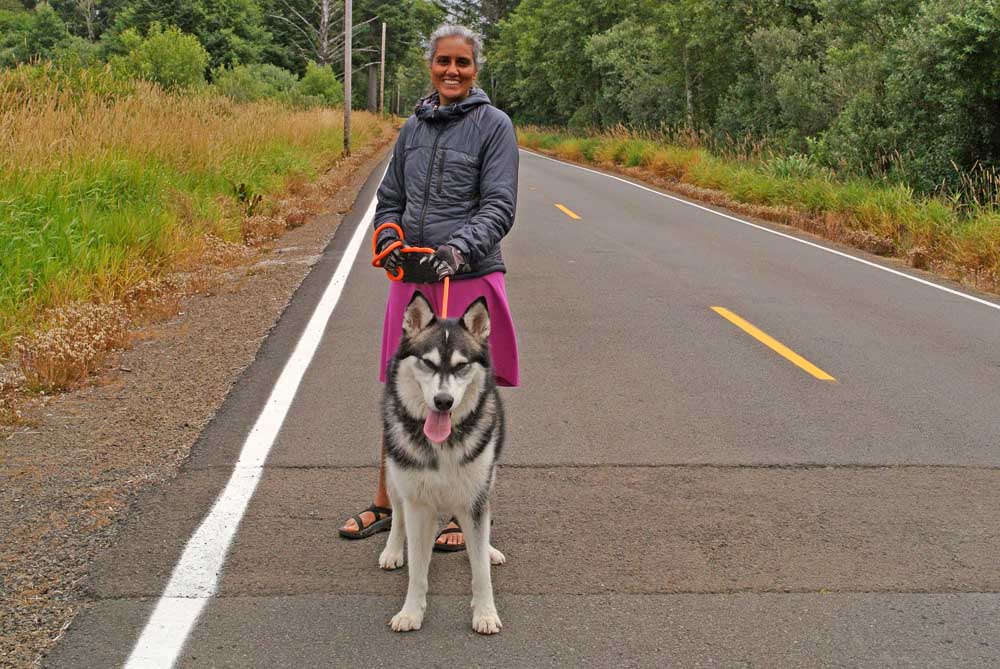Lost and found mutt highlights need for walkers and adopters
Published 9:12 am Friday, July 22, 2016

- Humaira Falkenberg walks Fiona outside the animal shelter in Long Beach as often as her busy schedule allows. She's happy to share her expertise with the breed, and help the shelter in the process. Plus, she added, “It fills a hole in my life as well.”
LONG BEACH, Wash. — Volunteer dog walkers are indispensable to almost any animal shelter. But when a young couple trotted off with an adorable 5-year-old red heeler recently, they didn’t come trotting back.
Trending
Staff and volunteers at the South Pacific County Humane Society in Long Beach were in disbelief. Saddened, they feared Pepper had been pinched.
Staff quickly turned to social media and printed fliers, replete with photos showing Pepper’s big wet nose poking at the camera.
“We just want her returned safely, we are not interested in how or why she was lost or not returned,” the poster read.
Trending
Shelter manager Sara Tokarz said three young women had seen the “Lost Dog” post on Facebook and took to the streets to search for Pepper last week, as did many others.
The trio eventually spotted the pooch and confronted the couple who were cooperative and handed over the dog. Pepper was then delivered back to the shelter, much to the relief of worried staff and volunteers.
Tokarz has been with the shelter for about two years and said something similar had never happened before on her watch. Board members also said they couldn’t recall any dog thefts.
The incident highlights some of the challenges animal shelters face as they work hard to find suitable homes while they also aim to extend a certain level of trust to volunteers that play a critical role in the overall effort of animal welfare and care.
The walks provide much needed exercise to the kenneled dogs, and the extra attention provides the socialization they’ll need for adoptions to stick.
The dog walkers who disappeared with Pepper purportedly said they had lost track of time on their walk, but intended to return the frisky heeler the next day.
“I’d like to think it was an honest mistake,” said Tokarz. “Maybe they did really just lose track of time.”
She added that, “It doesn’t really matter at this point. It just matters that the dog is back.”
Tokarz said the shelter sees a mix of long-term volunteer dog walkers and drop-ins. She said she doesn’t want to discourage drop-ins, but stated the board is reviewing its policies and considering revising them to prevent any more cases of disappearing dogs.
Right now, Tokarz reports the shelter keeps about half a dozen regular dog walkers busy. More regular volunteers would help. “We can never have enough,” said Tokarz.
She encourages people that do want to come in and walk dogs to take care of the paperwork and orientation in advance.
“We in no way want to discourage people from walking the dogs, but there does have to be a process,” Tokarz said.
On the day of Pepper’s return, Humaira Falkenberg, of Ilwaco, was at the shelter to walk Fiona, a massive Siberian Husky and malamute mix. It’s something she does many times a week, almost always on her lunch hour.
Sometimes, the two go running. Falkenberg appreciates a partner that can keep up.
Other times, Fiona even stays the night. “That allows her to be socialized in a home,” Falkenberg said.
Falkenberg paused on a walk to answer some questions as Fiona tugged this way and that. One stern command and the big dog was sitting (almost) placidly.
“She’s a really sweet dog,” Falkenberg explained, “but she needs training.”
Falkenberg knows. She once owned a Siberian Husky, just like Fiona.
The breed, she said, have an independent streak, but they also need a lot of exercise to be calm. That means Fiona has to be worked every day, “so they can’t be an ornament dog.”
Tokarz was reluctant to speculate why Pepper may have been targeted. She said the medium-sized dog is probably not a purebred, but, “she’s a very unique looking dog.”
Pepper is great with people and children, Tokarz said, but doesn’t get on well with other dogs. That was a concern when Pepper’s whereabouts were unknown.
Safely back at the shelter, the 5-year-old red heeler looked in good spirits, waggling her tail as volunteers petted her thick spotted coat. Pepper stiffened to attention when some curious crows landed in a field nearby.
Tokarz said Pepper has proven to be well-behaved, even when left alone in a home. She can be taken on runs and loves affection. But it would be best, Tokarz said, if she were an “only dog,” and probably shouldn’t be around chickens or other pet birds.
“She’d really make a wonderful pet,” said Tokarz. “They’re herding dogs. They’re smart dogs.”
Currently the shelter houses 19 pups and has 21 kennels. “We’re pretty full,” said Tokarz.
Pepper was originally under the care of the Harbor Animal Volunteer Association, a largely foster-based program out of Raymond that does not have a shelter proper. Tokarz said one of her volunteers that was involved with both programs had suggested Pepper might have a greater potential for adoption if she could be seen by more people.
That brought Pepper to the peninsula.
The shelter depends on volunteer and membership support. Reasonable adoption fees cover some operating costs, including care and vaccinations for the animals.
But Tokarz said the shelter’s needs extend well beyond dog-walking. Socialization is equally important. That goes for cats, too. One kind soul, said Tokarz, has volunteered to help with some half-feral kittens, just touching and interacting with them. “That’s a huge help to us,” Tokarz said.
Tokarz admits that social media is not really her bag, but when it comes to missing pets, as a tool, she said, the online message board cannot be beat.
Within hours, hundreds had shared the link about Pepper. “It went viral,” said one volunteer.
It also helps, Tokarz said, to live in a town that cares about its pets.
“It’s kind of amazing how this community is,” Tokarz said. “There were so many shares, and so many people out looking for her.”
Sandy Clancy, South Pacific County Humane Society board president, said interactions with the public are indispensable, and almost always positive.
Kittens need cuddling. Dogs need walking. And people need pets.
Clancy said the shelter abides by a system where interested dog walkers fill out an application, read a handbook, sign their name to an agreement, and in some cases, receive additional information or training from a more experienced staff member or volunteer.
That’s normally how it would work, said Clancy, but admitted personnel can be stretched, and trust had perhaps eclipsed the more ideal protocol in Pepper’s case.
“We didn’t do the things that needed to be done,” Clancy said, adding that more information should have been collected before Pepper was allowed to parade away.
Lesson learned, Clancy said.
From now on, “they will need to go through all of our procedures.” Which, she added, “is better for them, better for us, better for the animal.”
Police had been contacted when the dog went missing, and notified when the dog was returned.
But Clancy said it’s possible the doggie disappearance was an innocent mistake.
“Most everyone is really good,” Clancy explained. “We’re just extremely thankful.”









